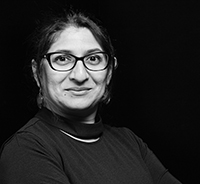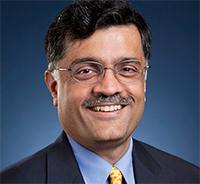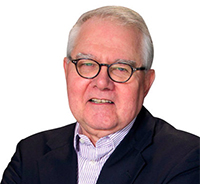Funding a decade of innovation.
Thanks to everyone who joined us for 2030: What the Future Holds. We hope you’ll continue to participate in more a2Tech360 events. Attendees can look for presentation materials and videos the week of October 5.
Individual presentations are available here.
About 2030: What the Future Holds
Futurists and global thought leaders discuss trends and revolutionary products in healthcare, IoT, AR/VR, mobility, and other driving industries with a foothold in the region.
Co-presented by Ann Arbor SPARK and the University of Michigan Office of Tech Transfer.
Speakers

John Denniston
Shared-X
Biography
John Denniston
John is a Co-Founder and Executive Chair of Shared-X, a for-profit company that also lifts smallholder farmer incomes and deploys regenerative farming techniques. Shared-X has created an array of business and impact solutions along the three dimensions that define its Impact Farming system: agronomy, market access, and smallholder integration. The company has been named a Top 100 Global Impact Company by Real Leaders, a Top 200 Global Impactful Solution by the MacArthur Foundation, and a Top 250 Global Game Changer by GSV.
Previously, John was a Senior Partner at the Silicon Valley venture capital firm Kleiner Perkins, and before that, a Managing Director and the Head of Technology Investing Banking for the Western U.S. for Salomon Smith Barney. He began his career as a corporate lawyer in Silicon Valley.
John earned his B.A. in Economics and J.D. from the University of Michigan. In the Fall of 2019, he co-taught a graduate-level course, The Impact Economy, at the University of Michigan. John delivered the commencement addresses to the University of Michigan Ross School of Business Class of 2008, the Dominican School of Philosophy and Theology Class of 2016, and the University of Michigan Department of Economics Class of 2020.

Upali Nanda
HKS Inc and
Taubman College of Architecture
Biography
Upali Nanda
Dr. Upali Nanda is Principal and Firmwide Director of Research for HKS, a global architectural firm where she is responsible for spearheading and implementing research projects globally. She also teaches as Associate Professor of Practice at the Taubman School of Architecture and Urban Planning at the University of Michigan and serves as the Executive Director for the non-profit Center for Advanced Design Research and Education.
Her award-winning research around human health and wellbeing, neuroscience and architecture, and outcome-driven design has been widely published and cited in peer-reviewed journals and mainstream media. Her doctoral work on “Sensthetics” has been published as a book available on Amazon.
In 2015, Dr. Nanda was recognized as one of the top 10 most influential people in Healthcare Design by Healthcare Design Magazine. In 2018, she was honored by Architectural Record with the Women in Architecture Innovator Award.

Michael Psarouthakis
University of Michigan Office of Tech Transfer Venture Center
Biography
Michael Psarouthakis
Mike leads the Tech Transfer Venture Center working with U-M faculty, staff, and students on new company formation based on intellectual property discovered and developed at the University of Michigan’s 19 schools. He will also manage the investment activity of the Accelerate Blue Fund. Mike has over 30 years of entrepreneurial, senior management, and venture fund experience in both the public and private sectors.
Before joining the University of Michigan Mike was the Vice President of Business Acceleration at the Michigan Economic Development Corporation where he oversaw a $250 million portfolio of investments in over 150 early stage technology companies. Prior to the MEDC, he was an Assistant Vice President at Forest Health Services where he managed a $50 million corporate venture fund that focused on life sciences, IT, and manufacturing opportunities.
Mike has directed several successful company exits and is the founder of four companies. He has served on numerous profit and non-profit boards and advisory boards including; eBay, PayPal, Compendia Biosciences, Online Technologies, the College of Creative Studies in Detroit, and the Ann Arbor Local Development Financial Authority. He remains very active in the Michigan startup community working with Invest Michigan, Ann Arbor SPARK, Invest Detroit, Accelerate Michigan Innovation Competition, Great Lakes Entrepreneur’s Quest, TechArb, DTE Energy Business Plan Competition, and many others.
Mike earned his MBA with concentrations in corporate strategy and marketing and MS in natural resource management from the University of Michigan. He also holds a BS in history and political science from Eastern Michigan University.

Venkat Ramaswamy
Ross School of Business
Biography
Venkat Ramaswamy
Venkat Ramaswamy is a professor of marketing at the Ross School of Business, University of Michigan. He is a globally recognized thought leader, idea practitioner, and eclectic scholar with wide-ranging interests in innovation, strategy, marketing, branding, IT, operations, and the human side of the organization.
Venkat’s award-winning book in 2004, The Future of Competition, co-authored with the late C.K.Prahalad, introduced co-creation as a revolutionary concept. It provided a new frame of reference for jointly creating value through experienced environments and called for a process of co-creation—the practice of developing offerings through ongoing collaboration with customers, employees, managers, financiers, suppliers, partners, and other stakeholders. Their articles, the popular 2000 Harvard Business Review article “Co-opting Customer Competence” and the 2003 MIT-PwC award-winning Sloan Management Review article “The New Frontier of Experience Innovation” envisioned an individual and experience-centric view of interactive value creation and innovation.
Between 2005 and 2010, with the explosion of digital and social media, a convergence of technologies and industries, embedded intelligence, and IT-enabled services, Prof. Ramaswamy continued to engage in action-based research and writings that explored how enterprises were building engagement platforms that enabled “large-scale ongoing interactions” among the firm, its customers, and its extended network. Success lay in using people’s actual experiences to generate insights and change the nature and quality of interactions in “Building the Co-creative Enterprise,” the subject of a bestselling Harvard Business Review article. “Leading the Transformation to Co-Creation of Value,” the subject of the Emerald Literati award-winning Strategy & Leadership article, called for co-creation from the inside out of enterprises and their networks, as much as co-creation from the outside in, and how leaders at all levels must co-create transformation pathways.
Venkat’s 2010 book, The Power of Co-Creation (with F. Gouillart) showed how enterprises in over twenty industry sectors — from automotive products, consumer durables, capital-intensive equipment, and industrial goods and services, to fast-moving consumer goods, retail, media, entertainment, and travel, to information technology and professional services — were all leveraging platforms to create new interactions with people everywhere in the system and how new forms of value could be created together with individuals through a focus on human experiences.
At the same time, offerings were no longer “finished and fixed” in the traditional sense but brought together artifacts, persons, processes, and interfaces in purpose-built digitalized interactive platforms that enabled continued creation of value by individuals and enterprises. It also became evident that co-creation thinking challenged the nature of enterprises, their organizing and governance, and the relative roles of the plural, private, and public sector enterprises in how economies and societies were being shaped.
In 2014, Venkat published The Co-Creation Paradigm (with K. Ozcan), a clarion call to action — to help create a new world of possibilities together. It argued that ultimately, all of us will have to see, think, and act differently—not just as practitioners or academics but as individuals in economy and society — thereby rebalancing the relative influence of the individual and the institutions of plural, private, and public sector enterprises.
Venkat is currently working on co-creating systemic transformation and positive impact on wellbeing-wealth- welfare, through platforms in digitalized societal ecosystems that afford the enactment of interactional creation by engaging and organizing actors (across the plural, private, and public sectors).
He has mentored several enterprises across the United States, Europe, Asia, and Latin America to conceive and execute new practices through co-creation, and build management capabilities.

Skip Simms
Ann Arbor SPARK
Biography
Skip Simms
Skip Simms joined Ann Arbor SPARK in 2006 as Director of Entrepreneurial Services and was its second employee. In 2011, he was named Senior Vice President. Skip oversees all the entrepreneurial activities including incubators, business accelerator programs, and all capital programs.
He was the architect of the Michigan Pre-Seed Capital Fund co-investment program, the multiple microloan programs managed by SPARK, and the MI Innovation Equipment Depot. His newest initiative is the Michigan Angel Fund.
Skip has nearly fifteen years of experience in financing and investments. Prior to joining Ann Arbor SPARK, he was the Managing General Partner at the Ralph Wilson Equity Fund, a $31 million fund-of-funds.
Skip was a charter member of the Michigan Venture Capital Association and currently serves on their Board of Directors. He is a past board member of the New Enterprise Forum. You may have seen him at an entrepreneur event or program, as he is often asked to serve on panels or make presentations regarding start-up funding.

Bryan Stiekes
Biography
Bryan Stiekes
Bryan has nearly 20 years of experience in edge computing, enterprise systems development, software defined networking, and security. At Google, Bryan works with Google customers to evolve their infrastructure, services, and systems to comprehend the emerging IT ecosystem, identify and solve new and valuable problems with Google. Bryan brings the knowledge and insights gained from these customer engagements to bear working across Google’s engineering and product management teams to develop new and meaningful services and solutions.
Prior to joining Google, Bryan was a Fellow & Vice President at Hewlett Packard Enterprise where he was responsible for pulling together a cohesive networking and hybrid computing strategy within HPE’s Software Defined and Cloud products group. Throughout his career with EDS, HP, and HPE Bryan had the opportunity to design and build both IT systems and products within the Enterprise Services, Public Cloud, and Networking business units.



